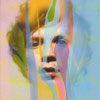BECK : SEA CHANGE
- The Golden Age
- Paper Tiger
- Guess I'm Doing Fine
- Lonesome Tears
- Lost Cause
- End of the Day
- It's All in Your Mind
- Round the Bend
- Already Dead
- Sunday Sun
- Little One
- Side of the Road
Label : Geffen
Released : 2002
Length : 52:26
Review (AllMusic) : Beck has always been known for his ever-changing moods -- particularly since they often arrived one after another on one album, sometimes within one song -- yet the shift between the neon glitz of Midnite Vultures and the lush, somber Sea Change is startling, and not just because it finds him in full-on singer/songwriter mode, abandoning all of the postmodern pranksterism of its predecessor. What's startling about Sea Change is how it brings everything that's run beneath the surface of Beck's music to the forefront, as if he's unafraid to not just reveal emotions, but to elliptically examine them in this wonderfully melancholy song cycle. If, on most albums prior to this, Beck's music was a sonic kaleidoscope -- each song shifting familiar and forgotten sounds into colorful, unpredictable combinations -- this discards genre-hopping in favor of focus, and the concentration pays off gloriously, resulting in not just his best album, but one of the greatest late-night, brokenhearted albums in pop. This, as many reviews and promotional interviews have noted, is indeed a breakup album, but it's not a bitter listen; it has a wearily beautiful sound, a comforting, consoling sadness. His words are often evocative, but not nearly as evocative as the music itself, which is rooted equally in country-rock (not alt-country), early-'70s singer/songwriterism, and baroque British psychedelia. With producer Nigel Godrich, Beck has created a warm, enveloping sound, with his acoustic guitar supported by grand string arrangements straight out of Paul Buckmaster, eerie harmonies, and gentle keyboards among other subtler touches that give this record a richness that unveils more with each listen. Surely, some may bemoan the absence of the careening, free-form experimentalism of Odelay, but Beck's gifts as a songwriter, singer, and musician have never been as brilliant as they are here. As Sea Change is playing, it feels as if Beck singing to you alone, revealing painful, intimate secrets that mirror your own. It's a genuine masterpiece in an era with too damn few of them.
Review (Wikipedia) : Sea Change is the eighth studio album by American alternative rock artist Beck and was released in September 2002. Inspired by the dissolution of a relationship, Sea Change received glowing reviews upon its release. Sea Change peaked at #8 on Billboard's Top 200 chart and was eventually certified gold in March 2005. In the UK charts, it peaked at #20. As of July 2008, Sea Change has sold 680,000 copies in the United States. On Sea Change, much of Beck's trademark recondite, ironic lyrics were replaced by more sincere, simpler lyrical content. He also eschewed the heavy sampling of his previous albums for real, live instrumentation. In interviews, Beck cited the breakup with his long-term girlfriend as the major influence on the album. In 2002, Sea Change was one of only two albums to receive Rolling Stone magazine's highest rating of five stars, the other being Bruce Springsteen's The Rising. The magazine went on to call it the best album of 2002. The next year, the album was ranked number 440 on Rolling Stone magazine's list of the 500 greatest albums of all time. It was ranked number 17 on Rolling Stone's list of the 100 best albums of the 00s. It is said that the album sound concept is inspired by the sound of Serge Gainsbourg's album Histoire de Melody Nelson. Beck would later produce an album for, and record with, Gainsbourg's daughter Charlotte. Critics have also compared the acoustic and relaxed melodies of Sea Change to the works of British singer-songwriter Nick Drake and Bob Dylan's 1975 album Blood on the Tracks. The album was re-released in a remastered form by Mobile Fidelity Sound Lab in June 2009. Sea Change was released with four different album covers, each version containing distinct digital artwork by Jeremy Blake on the CD and the booklet. There were also different hidden messages (lyrical snippets) written under each version's CD tray. The original cover art for the album was used as an effigy in the music video for lead single "Lost Cause".
